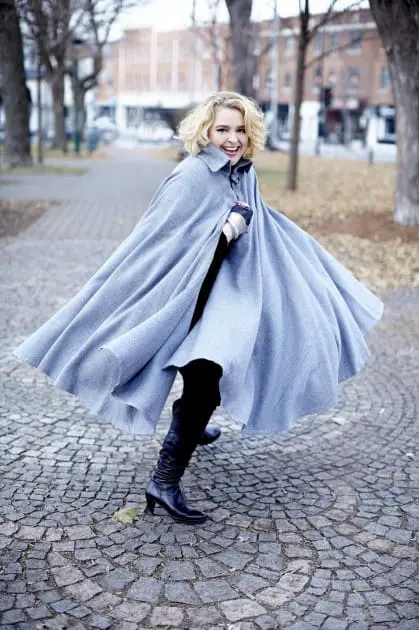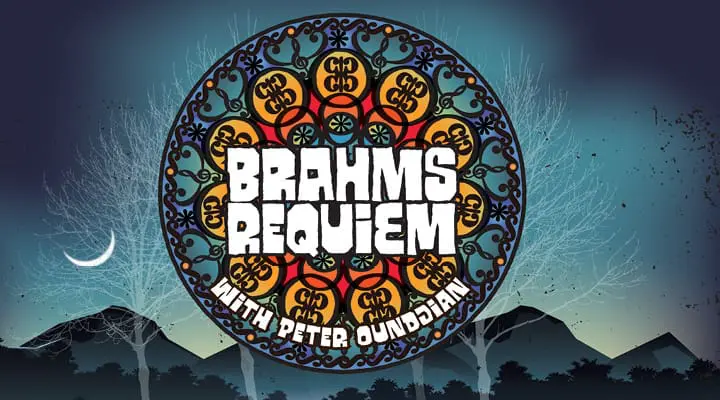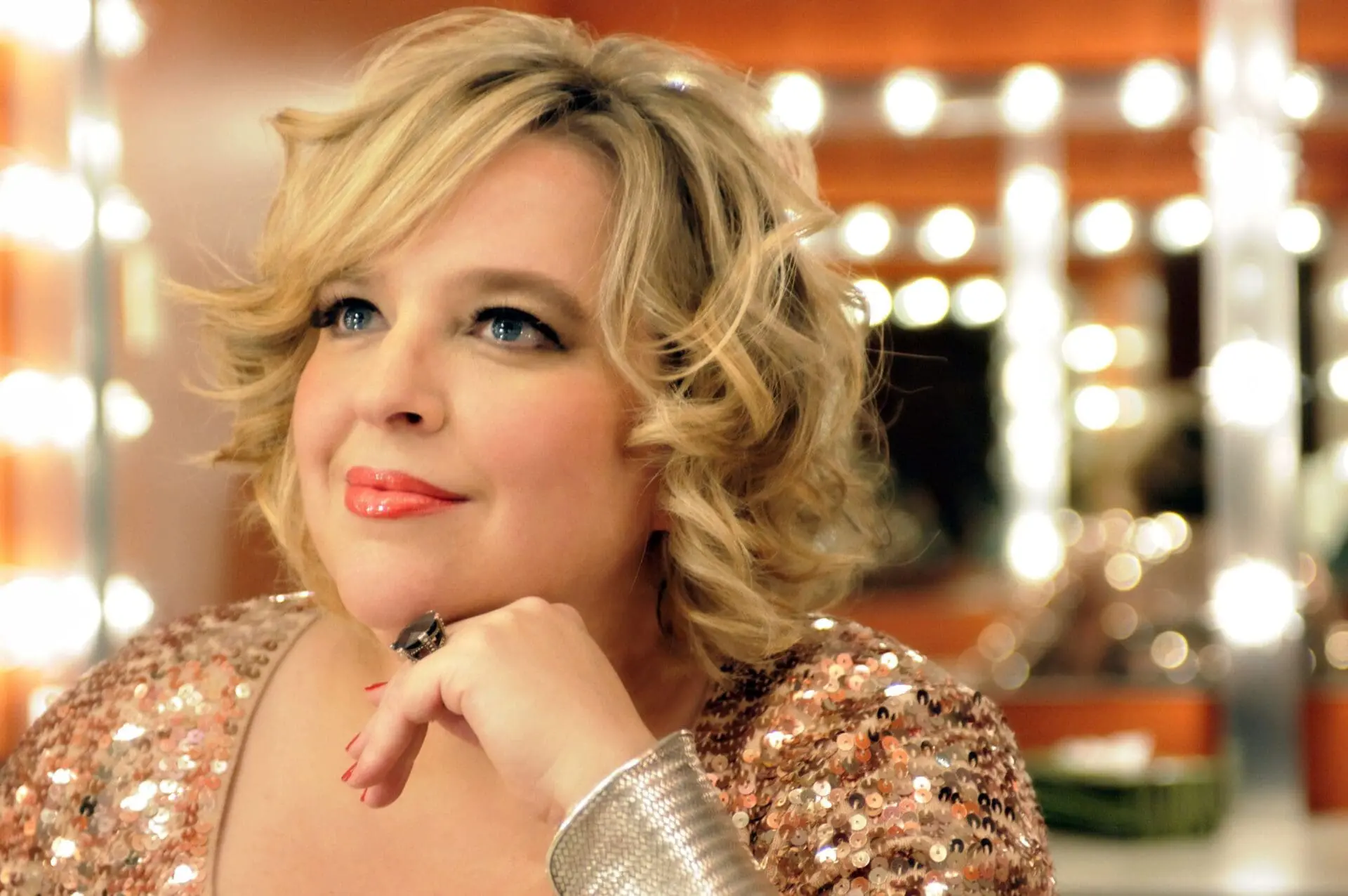Canadian soprano Karina Gauvin is our Artist of the Week. This week, Gauvin sings A Human Requiem (Brahms’s Requiem) alongside Canadian baritone Joshua Hopkins with the Colorado Symphony conducted by Canadian-American Peter Oundjian (performances run from March 24 to 26).
Gauvin is recognized for her work in the baroque repertoire, she has performed on many of Europe and North America’s stages (including Théâtre des Champs-Elysées, Bayerische Staatsoper, Glyndebourne Festival, Orchestre symphonique de Montréal, and New York Philharmonic). Her extensive discography—over 50 titles—has earned her a number of accolades, including a Chamber Music America Award for her recording of ATMA Classique’s “Fête Galante” with pianist Marc-André Hamelin, 3 Grammy nominations for her recording of Erato Record’s “Steffani: Niobe, Regina di Tebe” for the Boston Early Music Festival, several Opus Prizes, and multiple Juno Award wins and nominations. In late 2020, she was named Artist-in-Residence for Mécénat Musica, a philanthropic program created by donors for donors to make a sustainable contribution in music and the arts.
Other highlights coming up for Gauvin include: Händels Welt with Italian conductor Attilio Cremonesi at Oper Halle on June 9, and Bertin’s Fausto in Paris with Théatre des Champs-Elysées also featuring French mezzo-soprano Karine Deshayes, Croation bass Ante Jerkunica, and Maltese tenor Nico Darmanin on June 20.
When was your first singing lesson?
My first singing lesson was with mezzo soprano Catherine Robbin, I was 17 years old.
Heels or flats?
Wedges
Who is a singer you admired from the past?
Fritz Wunderlich
What’s your favourite orchestral instrument?
The oboe for its lilting, melancholic tone; it’s a sound that moves me so completely.
What’s your favourite thing about singing with an orchestra?
For me there is something so intoxicating about sharing music with an orchestra. I would say it’s probably about the fact that all these souls are coming together as one to convey a musical message.
Which role do you wish you could sing, but is not in your voice type?
I have said this before. I would love to sing Bartolo in Nozze di Figaro hahahaha!
Tent or hotel?
A hotel in the woods.
Who inspired you to sing?
Many know that Regine Crespin was an early inspiration for me. Her very special and instantly recognizable timbre as well as her impeccable interpretative skills moved me to my core. In my later years as a young student, I was equally inspired by Janet Baker, for the very same reasons.
What’s your ancestry?
French from Normandie on both sides of the family. My lineage also goes back to a “fille du Roy” on my mother’s side. These young women were sent over by King Louis XIV to populate the New World. A very important part of our heritage here in Canada. I also have a little bit of Irish on my father’s side like most Quebecers.
Coffee or tea?
Earl Grey tea all the way and coffee, only in Italy!!
What’s your favourite mind-calming practice?
I love to swim and I have done that for decades. Before the pandemic, I had already started meditating. It became a daily practice during the pandemic and pulled me out of some very dark places. I am very thankful to have incorporated it into my life.
Are there more musicians in your family?
Both my parents were singers but did not pursue a musical career. My sister was a singer for Cirque du Soleil for 12 years in Las Vegas.
What nickname do your friends call you and why?
Years ago, Bernard Labadie nicknamed me “Karinetta Bella chichix”, the “chichix” takes it’s inspiration from cartoon characters in the Asterix et Obelix books. These books were elevated to cult like status in French Canada. The chichix part fell away pretty quickly and the “Karinetta” is what remained.

Graphic from Astérix et Obélix, “Le Guerrier” © Albert Uderzo
Do you enjoy cooking? What is your best dish?
It was a joy to get back into cooking during the pandemic and play an active part in some new health choices. I started exploring Korean cooking and all sorts of different dishes. I have a knack for taking bits and pieces leftover in the fridge and making something delicious to eat. I love to explore and try new things. I love flavor, texture and most importantly, CRUNCH!! I also got into green smoothies in a big way. 🙂
What is one thing that you cannot live without?
Bright red lipstick!!
Were there any directors in the past that have really inspired you?
Yes. Denis Podalydès who staged my very first Vitellia at the Théâtre des Champs-Elysées in Paris. He is quite a famous French actor and director and is sociétaire with La Comédie Française. So acting is his life, his business. He had a way of putting himself into my skin and character and working with me as the person AND the singer. I really felt he was dealing with me directly and I was not being forced to superimpose his concept of Vitellia. It was never artificial but all about making Vitellia “mine” as it were.
I became Vitellia in this show and it felt totally organic. It’s very rare to have such a rapport with a director. I would say it’s probably because he is an actor himself that this collaboration was made so clear. Similarly in recent months, I worked on a new production of Alcina with Jiri Herman in Brno and Versailles. The rapport was also one of very human scale and he helped me envision Alcina in a new light. Jiri is a very hands-on kind of director. Which means he was right there with us in the rehearsal space, kneeling, jumping, throwing things around the room. I nicknamed him the Czech energizer bunny!!!
What is happiness for you?
The pandemic was a moment of profound reflection. I would have to say, being at peace with oneself, loving and being loved.
LEARN MORE ABOUT KARINA
VISIT HER WEBSITE

Karina Gauvin © Julien Faugère Photographe
A Human Requiem
(Brahms’s Requiem)
with Peter Oundjian
Colorado Symphony
March 18, 21, 23 & 26, 2023

KARINA GAUVIN / JOSHUA HOPKINS / PETER OUNDJIAN (CONDUCTOR) / COLARADO SYMPHONY CHORUS / DUAIN WOLFE (DIRECTOR)
Unlike other Requiem Masses, Brahms’s A German Requiem is not primarily a Mass for the dead. Instead, it is intended as comfort and solace for those left behind as they mourn the death of others. Confronting life as much as it does death, Brahms further differentiates his Requiem by setting excerpts from the Lutheran Bible and apocrypha in German instead of the Catholic, Latin text used in the Requiem Masses by Mozart, Verdi, and Berlioz. The Colorado Symphony Chorus and two vocal soloists lend distinction to this stunning masterpiece, which remains one of the most revered choral works ever composed. A taste for the exotic surfaces often in the catalogue of Maurice Ravel and his orchestral song cycle Shéhérazade is no exception.
Named for the protagonist of One Thousand and One Nights, Shéhérazade is a woman who employs her imagination as a means of escape. “Je voudrais voir…”, she repeats, meaning “I would like to see…”, this refrain sets the tone for Ravel’s song cycle which drips with color evoking images of the far east. Drawing on music from the opera, Weber’s Overture to Oberon is a celebration of the supernatural realm. Like in Mozart’s The Magic Flute, Weber establishes Oberon’s horn as a mystical instrument and its call as a leitmotif throughout the overture, unleashing an exuberant conversation between instrumental voices and concluding with a virtuosic flourish conducted by Maestro Peter Oundjian..
Opera Canada depends on the generous contributions of its supporters to bring readers outstanding, in-depth coverage of opera in Canada and beyond.
Please consider subscribing or donating today.














